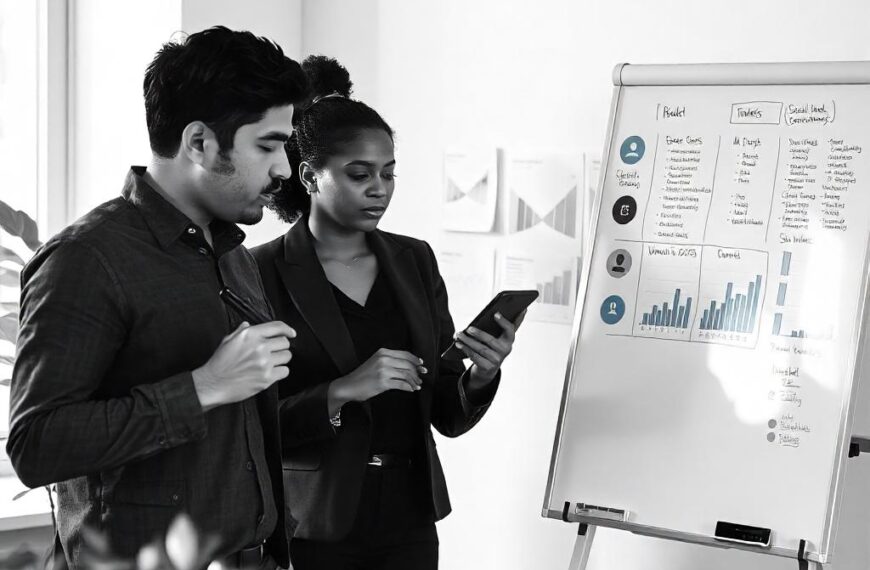Artificial intelligence (AI) has transformed the social media landscape, offering powerful tools to improve content creation, customer engagement, and data-driven decisions. By integrating AI into social media strategies, brands can enhance efficiency, provide personalized experiences, and gain actionable insights. Here’s how AI can elevate your social media strategy and give you a competitive edge.
1. Automating Content Creation and Scheduling
AI tools can streamline the content creation process, saving time and allowing teams to focus on more strategic tasks. From automated writing tools to graphic design platforms, AI-powered software can create captivating posts with minimal effort.
Start Your Remote Career with a Professional Portfolio
- AI Writing Assistants: Tools like ChatGPT or Jasper AI help generate social media captions, blog posts, and articles. These tools can maintain a consistent tone and voice across content, keeping the brand’s messaging cohesive.
- Content Scheduling: AI-powered scheduling tools like Buffer and Hootsuite optimize the posting time based on audience engagement patterns. This automation ensures posts go live at the best times to maximize reach without manual intervention.
- Creative Assistance with Design: Platforms like Canva or Adobe Spark use AI to suggest design layouts, color schemes, and graphic elements that align with the brand’s style. This feature enables the creation of visually appealing posts without needing extensive design expertise.
2. Enhancing Customer Engagement with Chatbots
AI-powered chatbots are revolutionizing customer service on social media, providing quick and accurate responses while freeing up human resources. Chatbots can interact with users 24/7, answering frequently asked questions, processing orders, or even offering product recommendations.
- Personalized Customer Service: AI chatbots use natural language processing (NLP) to understand and respond in conversational language. They can analyze user queries and provide personalized answers based on past interactions.
- Lead Generation and Qualification: Chatbots can engage users by asking qualifying questions to determine if they are potential customers. This data helps sales teams focus on leads with a high potential for conversion.
- Instant Response to FAQs: Bots handle common questions about products, services, or policies instantly, reducing wait times and improving customer satisfaction.
Top Freelance Services To Offer in 2025 Guide
3. Predicting Trends and Consumer Behavior with AI Insights
AI’s predictive analytics can analyze vast amounts of social media data to identify trends and forecast user behaviors. Brands can use this information to adjust their strategies in real-time, staying ahead of competitors.
- Trend Analysis: Tools like Sprout Social and Brandwatch monitor keywords, hashtags, and topics to identify emerging trends. AI algorithms can spot shifts in user sentiment or rising topics, giving brands the chance to align their content with what’s currently relevant.
- Audience Behavior Insights: By analyzing engagement patterns, AI tools provide insights into user behaviors, such as peak activity times, content preferences, and purchasing habits. This data helps brands tailor their messaging to match audience expectations.
- Content Performance Forecasting: AI can predict how well a post will perform based on factors like previous engagement, content type, and posting time. This insight helps marketers create content strategies backed by data, minimizing the guesswork.
4. Optimizing Ad Targeting and Campaigns
AI-driven ad platforms allow brands to refine their targeting and ensure ads are seen by the right audience. AI can optimize ad placement, monitor performance, and even adjust campaigns in real-time to maximize return on investment (ROI).
- Audience Segmentation: AI helps brands create precise audience segments based on demographics, interests, and online behaviors. This allows for more personalized, relevant ads that are likely to resonate with users.
- Dynamic Ad Adjustments: Many AI-powered ad platforms, such as Facebook and Google, automatically optimize ads based on performance metrics. If certain visuals or captions generate higher engagement, AI algorithms can adjust campaigns to feature more successful elements.
- Retargeting with Precision: AI can track users who interacted with a brand’s social media content but didn’t convert. By analyzing user behavior, AI enables precise retargeting efforts to re-engage potential customers and drive conversions.
Learn How to Earn by Posting on Social Media Without Showing Your Face!
5. Generating Personalized Content for Enhanced User Experience
AI enables a deeper level of personalization by analyzing user preferences and engagement data. Personalized content is more likely to capture attention and foster engagement, creating a positive experience for users.
- Tailored Recommendations: Algorithms can recommend products, articles, or videos based on users’ previous interactions, making the content more relevant and engaging.
- Customizable Visuals and Messaging: AI-powered platforms like Phrasee can craft personalized text and imagery for individual users, refining message content to match user preferences. This level of personalization makes users feel valued, fostering brand loyalty.
- Dynamic Content Creation: Some AI tools use user data to dynamically create personalized content, like Spotify’s AI-generated playlists or Netflix’s personalized recommendations. Brands can use similar AI technology to suggest products, services, or blog articles.
6. Improving Influencer Marketing Strategies
AI can assist in identifying the most relevant influencers and measuring their impact on campaigns. By analyzing data from potential influencers’ profiles, AI can determine which influencers are likely to yield the highest ROI.
- Influencer Identification: AI tools such as Traackr or AspireIQ scan social media profiles to identify influencers whose followers align with a brand’s target audience. They analyze engagement rates, audience demographics, and relevance to ensure a strong fit.
- Assessing Influencer Impact: AI-powered analytics can evaluate the effectiveness of an influencer’s content, including engagement metrics, sentiment analysis, and ROI measurement. Brands can use this data to identify the most valuable partnerships and adjust their influencer strategies.
- Automating Influencer Outreach: AI can even assist in automating outreach and negotiating collaborations with influencers, making the process more streamlined and data-driven.
The Content Creator Bible: Over 1000 Websites and Ways to Make Money as a Content Creator
7. Ensuring Brand Safety and Managing Reputation
Brand safety and reputation are crucial in social media marketing, as user feedback and brand mentions can impact public perception. AI-driven tools can monitor brand mentions, flag potential crises, and enable quick responses.
- Sentiment Analysis: Tools like Brandwatch and Sprinklr use AI to conduct sentiment analysis, identifying positive or negative mentions of a brand. AI algorithms analyze the tone and context of user comments, allowing marketers to address potential issues early on.
- Crisis Management: AI can detect sudden spikes in negative mentions or unusual activity, alerting brands to potential PR crises. This early warning allows teams to address issues proactively, managing reputation and mitigating damage.
- Content Moderation: AI-driven moderation tools can automatically flag inappropriate or harmful comments, maintaining a safe space on a brand’s social media channels.
8. Improving Video and Visual Content Strategies
As video content dominates social media, AI plays a key role in optimizing visual strategies. AI can enhance video production, tailor visual content to audience preferences, and even analyze the impact of visuals on engagement.
- AI-Generated Videos: Platforms like Lumen5 and InVideo use AI to convert text content into engaging video formats, perfect for social media sharing. This allows brands to diversify content formats without extensive video production resources.
- Analyzing Visual Trends: AI algorithms can analyze which types of visuals resonate best with users, such as color schemes, themes, or design elements. This helps brands optimize visual content to match audience preferences and increase engagement.
- Video Performance Tracking: AI-powered tools assess video performance in real time, analyzing watch time, engagement rates, and viewer drop-off points. Brands can use these insights to refine video content and improve future performance.
9. Creating Immersive Experiences with AR and VR
AI-powered augmented reality (AR) and virtual reality (VR) are redefining how users interact with brands on social media. These technologies offer immersive, engaging experiences that can set a brand apart from competitors.
Monthly Social Media Management Services
- Augmented Reality Filters: AI and AR allow brands to create unique filters and effects that users can apply to photos and videos. These interactive experiences are highly shareable and can increase brand visibility.
- Virtual Shopping Experiences: With the rise of social commerce, AI and VR can create virtual storefronts where users can browse products, try them on virtually, and make purchases directly through social media.
- Enhanced Storytelling: VR-driven experiences let brands immerse users in stories and environments, creating emotional connections and a memorable user experience that goes beyond static content.
10. Optimizing Strategy with Real-Time Analytics and Insights
AI-driven analytics tools provide real-time data on social media performance, enabling brands to make adjustments to their strategies instantly. This helps ensure content resonates with audiences and keeps campaigns on track.
- Real-Time Monitoring: AI tools like Sprinklr and Socialbakers track social media engagement in real-time, offering insights into what’s working and what’s not.
- Customizable Reports: Many AI platforms offer advanced reporting features that allow brands to create tailored dashboards. This customization provides valuable data on metrics like engagement, follower growth, and campaign success.
- Continuous Optimization: By regularly analyzing and adjusting strategies based on real-time insights, brands can remain agile, adapting to audience preferences and improving campaign performance consistently.
Leveraging AI in social media marketing offers unparalleled opportunities for personalization, efficiency, and strategic insights.




